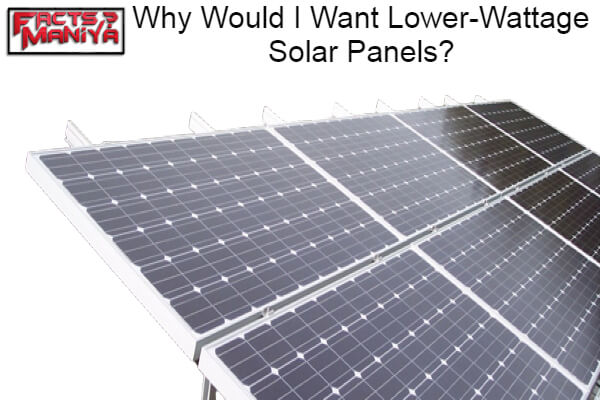The question is, Why Would I Want Lower-Wattage Solar Panels? Higher efficiency panels are significantly more expensive. They are justified when your available space is limited. If space is no issue, I would compare Watts per dollar and choose the best ratio. Make sure it’s a reputable company and their guarantee conditions are worthwhile.
Why Would I Want Lower-Wattage Solar Panels?
When you size your solar panel, you eventually run into this problem. Should you get more low-wattage panels or fewer high-wattage panels if you need a 3kW solar panel array? The wattage, efficiency, size, price, and cells are all built uniquely by each panel maker.

To maximize your investment, comparing them might be a challenging process. You might have already read a few various points of view and opinion pieces, but you still don’t know what the genuine solution is.
The panel’s dependability, sturdiness, quality, and warranty terms are the most satisfactory response. The price per watt is the next best thing to get the most out of your investment after these immeasurable elements.
In light of this, you ought to purchase a panel that offers you the best price per watt produced rather than one that is merely big and efficient. The best cost per watt is the most significant purchase unless a lack of room is your main worry and you need to fit all of your panels in a close location.
How Many Solar Panels Are Required For The Average American Home?
To generate all of the kilowatt hours of electricity a typical home uses annually, a 6-kW solar system is required. The residence size, the sorts of loads, and a person’s lifestyle can all significantly impact the amount of electricity used.
Generally speaking, a home heated by electricity requires a more extensive solar system than a home heated by natural gas, mainly if the latter is situated in a region with a colder climate. Because newer homes frequently use less electricity because they have more modern equipment, are airtight and well-insulated, and don’t use inefficient incandescent lightbulbs. Power is also used extensively while running air conditioning or charging an electric vehicle regularly.
For a 6-kW installation, approximately 16 370-watt Panasonic Evervolt panels would be required. The number of panels needed decreases if you use a higher wattage module. For a 6-kW array, you would only need 15 panels with the 400-watt REC Alpha or the 400-watt Q CELLS Q.Peak Duo, respectively. You would have required around 24 250-watt solar panels for the same output if you compared these to the 250-watt solar panels that were popular about ten years ago.
When Purchasing Solar Panels, What Should You Watch Out For?
When purchasing solar panels, you need to consider additional considerations in addition to floor size, cost, and conversion efficiency. The following crucial matter is:
Warranty Conditions And Coverage
The problem is that you can’t know how good the panel is by looking at it or reading some web reviews, isn’t that right? The best action is to protect your investment with a solid warranty.
The warranty mainly addresses performance and equipment. A contract protects you against potential engineering and manufacturing flaws throughout the equipment’s lifecycle. Manufacturers could advertise an incredible 10–25 years. However, the performance warranty covers the panel’s output power and efficiency for a specific period of time.
As a result, the manufacturer will replace the panel for you if its efficiency drops to 80 and 90 percent before the specified period. In a similar vein, warranty durations vary among manufacturers. So keep in mind to look them over, read the warranty claims, and make sure you comprehend the terms and circumstances of the guarantee.
Durability
The cost of solar panels is high. So, when choosing the ideal one for your home, you must be very careful. Even with the most substantial warranty protection, having a breakdown every other year and spending extra money on additional energy sources to compensate for your power loss is a pain.
Check the applicable wind and snow loads for your location to get started. These two factors indicate the safe range for applying pressure to the panels. It might not necessarily harm it, but if the elements of the weather damage a panel, the guarantee might be nullified. You can discover both load capacities on the manufacturer’s specification sheet, for instance: 5400 PA Snow Load / 210mph Wind Rating.
Temperature
The efficiency of solar panels is evaluated at a temperature of 25 °C because they are temperature-sensitive. This implies that a panel’s efficiency decreases dramatically as the temperature rises.
Suppose a panel’s temperature coefficient is -0.36% and its efficiency decrease by 0.36% per °C for each increase in temperature. There will be a prominent decrease in energy production when you have a large array of panels and your temperature doubles. Aside from that, regions with mild climates need not worry too much about this.
Aesthetics
The aesthetics of solar panels might be the least significant factor to consider, and some people might not even give it much thought. However, you might want to choose the more aesthetically pleasing panels to have a lovely view from your roof.
If money is tight, consider its curb attractiveness, though. With the help of SolarSkin, you can match your solar panels’ color, design, and pattern to the roof. If you’re concerned, it might forgo effectiveness in favor of beauty.
You are partially correct because it stops a tiny bit of UV radiation from passing through the thin coating, but it can also accomplish up to 99% of the array’s efficiency. What’s lovely about it, then? The harrowing film, which has undergone numerous tests to prove it can survive cracks, blisters, and yellowing, can lengthen the lifespan of your panels.
Conclusion
Before making an impulsive purchase, you must have a firm and fundamental comprehension of the few specifications listed in the spec sheet. The key elements to consider are power output, panel efficiency, warranty, and other topics this article covers.
You’ll be able to eliminate possibilities as you consider them and identify the best one for you as you do so. You might find it useful to read this article on Why Would I Want Lower-Wattage Solar Panels? if you haven’t determined your home’s energy usage or the array of panels required. Please don’t hesitate to contact us if you have any questions or concerns. We’ll be glad to assist you!

